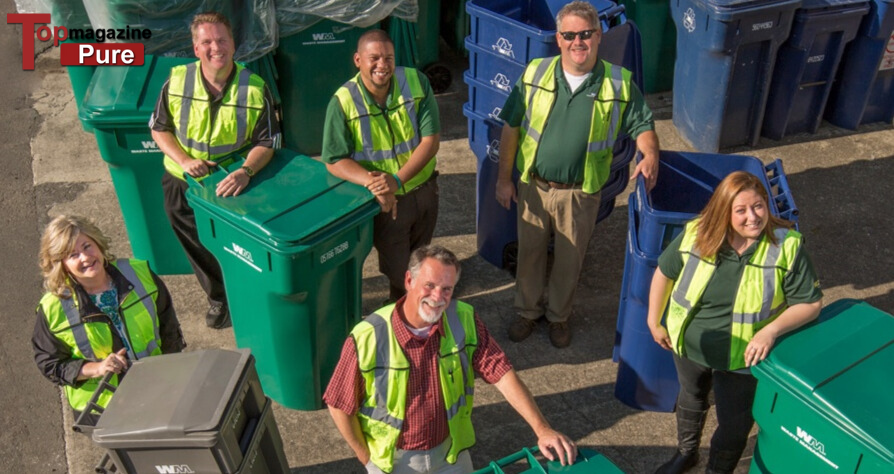Waste management is an essential industry that is crucial in maintaining environmental sustainability and public health. With growing concerns about pollution, climate change, and the global push for greener solutions, waste management careers are becoming increasingly important. Whether you’re interested in working directly with waste processing, engineering solutions for recycling, or managing logistics, the field offers various opportunities.
Understanding Waste Management Careers
Waste management careers encompass waste collection, transport, processing, recycling, and disposal. These careers contribute to reducing human activities’ environmental impact, ensuring sustainable resource use, and improving public health.
Professionals in this field work in various settings, including government agencies, private companies, and non-profit organizations, addressing issues such as landfill management, hazardous waste, recycling systems, and pollution control.
Types of Waste Management Careers
Waste Collection and Disposal Workers
Waste collection is the frontline of the waste management industry. Collection workers pick up residential, commercial, and industrial waste. They may operate trucks, lift and empty waste containers, or collect recyclables.
Essential Skills: Physical strength, attention to detail, and safety awareness.
Education: High school diploma, commercial driver’s license (CDL) for truck drivers.
Recycling Coordinators
Recycling coordinators promote recycling initiatives and ensure the efficiency of recycling programs. They work with communities and businesses to develop and implement strategies that increase recycling rates and reduce landfill waste.
Essential Skills: Organizational skills, communication, and knowledge of recycling technologies.
Education: Bachelor’s degree in environmental science, business administration, or a related field.
Wastewater Treatment Operators
These professionals oversee the systems that treat wastewater from residential, commercial, and industrial sources. Their work helps prevent water pollution and ensures safe water disposal or reuse. Wastewater treatment operators monitor equipment, test water samples, and perform maintenance tasks.
Essential Skills: Analytical skills, mechanical aptitude, and problem-solving.
Education: High school diploma, vocational training, or an associate degree in wastewater technology.
Environmental Engineers
Environmental engineers in waste management design systems for waste disposal, recycling, and pollution control. They work on projects that minimize environmental impacts, such as developing sustainable landfill designs or creating new recycling processes. Environmental engineers play a crucial role in shaping the future of waste management.
Essential Skills: Engineering expertise, innovation, and project management.
Education: Bachelor’s degree in environmental engineering or a related engineering discipline.
Hazardous Waste Specialists
Hazardous waste specialists handle materials dangerous to human health or the environment, such as chemicals, asbestos, and radioactive waste. They ensure that hazardous materials are safely processed, transported, and disposed of, following strict government regulations.
Essential Skills: Regulatory knowledge, safety awareness, and attention to detail.
Education: Bachelor’s degree in environmental science, chemistry, or a related field.
Waste Management Consultants
Consultants in waste management offer expertise to companies, municipalities, and other organizations seeking to improve their waste-handling processes. They analyze current waste disposal methods, recommend improvements, and help organizations meet regulatory standards.
Essential Skills: Analytical thinking, environmental law knowledge, and strong communication skills.
Education: Bachelor’s or master’s in environmental science, sustainability, or business management.
Landfill Managers
Landfill managers oversee the daily operations of waste disposal sites. They ensure that waste is stored and processed in compliance with environmental regulations and that the site is safe for workers and the surrounding community. Responsibilities include equipment management, environmental monitoring, and staff supervision.
Essential Skills: Leadership, organizational skills, and regulatory knowledge.
Education: Bachelor’s degree in environmental management or civil engineering.
Skills Needed for Waste Management Careers
Success in waste management careers requires technical knowledge, physical endurance, and problem-solving abilities. While some roles require advanced degrees, many positions are open to candidates with vocational training or practical experience. Common skills include:
- Technical Aptitude: Many waste management careers, such as engineering or hazardous waste handling, require specialized technical knowledge.
- Regulatory Knowledge: Understanding the laws and regulations related to waste disposal and environmental protection is crucial for compliance.
- Physical Stamina: Roles like waste collection often require manual labor and endurance.
- Problem-Solving: Whether managing a recycling program or developing a new waste treatment method, thinking critically is essential.
- Communication Skills: Many waste management roles, particularly those in consulting or management, require clear communication with teams, clients, or the public.
Education and Training for Waste Management Careers
The education requirements for waste management careers vary depending on the specific role. Here are some common educational paths:
- High School Diploma: A high school diploma is typically sufficient for entry-level roles such as waste collection or recycling coordinators. Additional on-the-job training may be provided.
- Associate Degree: Some technical positions, such as wastewater treatment operators, may require an associate degree in wastewater technology or environmental science.
- Bachelor’s Degree: Engineering and management roles often require a bachelor’s degree in environmental engineering, environmental science, or a related field. Programs in sustainability, business management, and civil engineering are also helpful.
- Certifications: Certifications can enhance job prospects and may be required for specific roles. Examples include the Hazardous Waste Operations and Emergency Response (HAZWOPER) certification or certifications in wastewater treatment and recycling management.
Future Trends in Waste Management Careers
The waste management industry is evolving rapidly due to technological advances, environmental regulations, and the global push toward sustainability. Key trends include:
- Automation and Robotics: Automated waste collection and sorting systems are on the rise, leading to more efficient processes and safer work environments.
- Circular Economy: The shift towards a circular economy, where waste is minimized and resources are reused, creates new opportunities in recycling, upcycling, and resource recovery.
- Green Energy: Waste-to-energy technologies, such as converting landfill gas into electricity, are becoming increasingly popular, driving demand for professionals with expertise in renewable energy.
- Environmental Compliance: As governments introduce stricter environmental regulations, companies need experts to ensure compliance, creating more jobs for waste management consultants, environmental engineers, and hazardous waste specialists.
Challenges in Waste Management Careers
While the industry offers a range of rewarding career paths, it also has challenges. Waste management professionals often work in demanding environments, dealing with hazardous materials, unpleasant conditions, or physical labor. Additionally, professionals in the field must stay up-to-date with changing regulations and technologies to remain effective in their roles.
Conclusion
Waste management careers offer various opportunities for individuals interested in environmental protection, sustainability, and public health. The field provides pathways for entry-level workers and highly skilled professionals, from collection and disposal to engineering and consulting. As the world increasingly focuses on sustainable practices, the demand for waste management careers is expected to grow, making it an exciting and vital industry for the future.
Whether you’re just starting your career or looking to transition into a new field, waste management offers the potential for meaningful work that positively impacts the environment and society.







